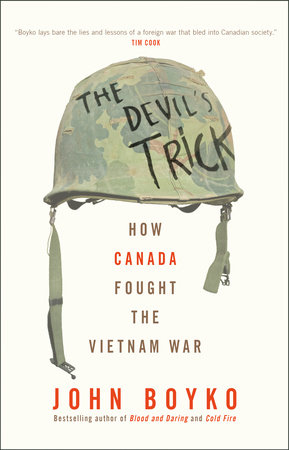John Boyko
 Email This Post
|
Email This Post
|  Print This Post
Print This Post
The historian John Boyko discusses his new book The Devil’s Trick: How Canada Fought the Vietnam War (Knopf, 2021), with Joseph Planta.
 |
The Devil’s Trick: How Canada Fought the Vietnam War by John Boyko (Knopf, 2021).
Click to buy this book from Amazon.ca: The Devil’s Trick |
Text of introduction by Joseph Planta:
I am Planta: On the Line, in Vancouver, British Columbia, at TheCommentary.ca.
John Boyko joins me again. As I was reading his latest book The Devil’s Trick: How Canada Fought the Vietnam War, or perhaps it was as I was preparing for our interview now, I saw that the book was to have been published a year ago, but had been postponed because of COVID-19. It has just been released to great acclaim, and I found it particularly apt that I was reading it in recent weeks, when discussions of the rise of anti-Asian hatred has been something that’s been prevalent in the discourse. The book is not only solid history, as all John’s books are, but there’s a marvelous narrative through this book that makes the characters lively, engaging, important and at times extraordinary. I’ll ask John about these guides he writes about in his book, as well as the heretofore lack of recognition of Canada’s contribution before, during and after the Vietnam War. We see in the chapter on the distinguished war hero and jurist here in British Columbia Sherwood Lett, about his efforts in the 1950s as the Canadian Commissioner for the International Control Commission, as the first Indochina War ended. There’s a chapter on Blair Seaborn, a Canadian diplomat who met secretly with the North Vietnamese in an effort to prevent the war. There’s a chapter on Claire Culhane, the war resister, who’d actually been in Vietnam as a nurse and who saw firsthand the folly and immorality of the war. There are chapters on Joe Erickson, a war resister who came to Canada, and Doug Carey, a Canadian who enlisted to fight. We see fifty years later the toll and impact of their respective decisions on themselves, their families, and Canada itself. And then there’s a chapter on Rebecca Trinh and her family. Fleeing Saigon, she and her family were one of many families who sought refuge in Canada. There are moving moments that Mr. Boyko illustrates so well with his writing, that I was often moved reading the book. It’s a book that we need at this time, and it’s a book that needs to be read, because Canada is a warrior society as John contends, and whether or not the conflict is officially declared, as Vietnam wasn’t, the effect of war is keenly felt. John Boyko is the author of seven previous books, including Sir John’s Echo, Cold Fire, Blood and Daring, and Bennett: The Rebel Who Changed and Challenged a Nation, a biography of R.B. Bennett. The latter he was first on the program with back in 2010. He is the former dean of history at Lakefield College School in Lakefield, Ontario, where he joined me from last week. Visit www.johnboyko.com for more information. This new book is published by Knopf. Please welcome back to the Planta: On the Line program, John Boyko; Mr. Boyko, good morning.
Podcast: Play in new window | Download ()
Subscribe: RSS

